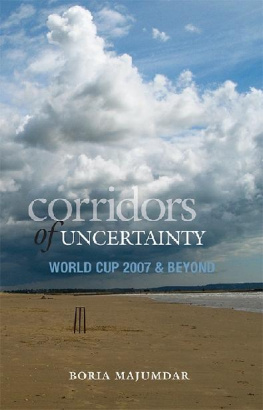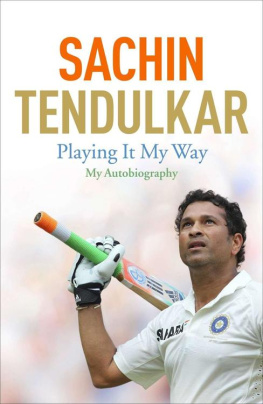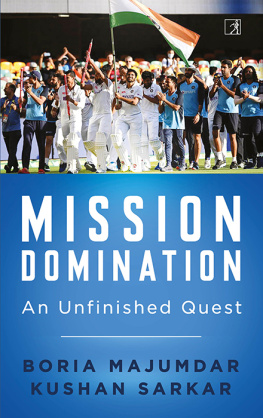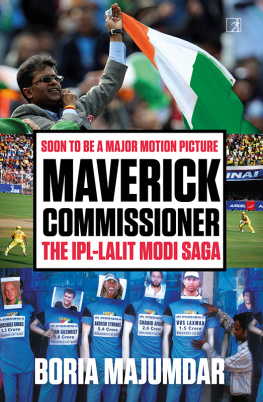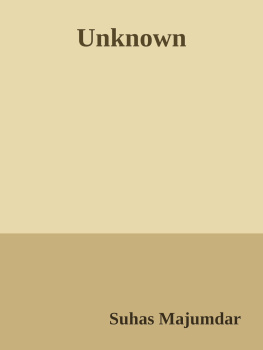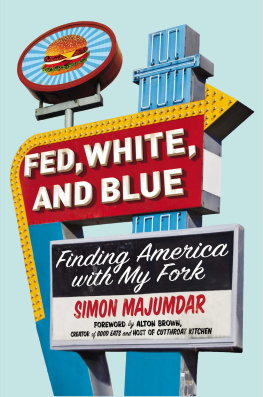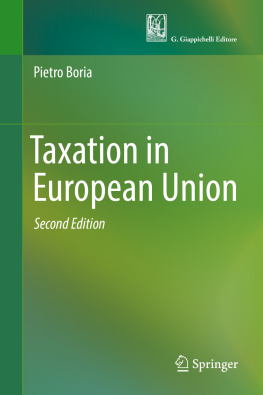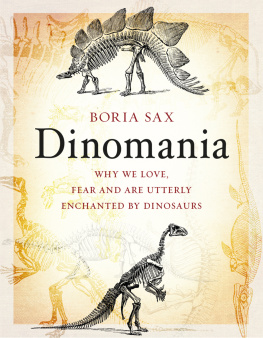Corridors of Uncertainty
World Cup 2007 & Beyond
B ORIA M AJUMDAR
HarperCollins Publishers India
Contents
Cricket at the Crossroads:
CWC 2007 as Watershed
It took more than three decades for the Cricket World Cup to reach the West Indies after it had travelled to most parts of the world. The World Cup in the Caribbean was expected to be the most exotic ever. Every time the word Caribbean is uttered, the mind races to a pristine land of the seas, blue like none else, party and fun-loving people, luxury cruises and yachts, the setting of James Bond films and of course cricket. Nowhere else has cricket been played with the same passion and verve as in the Caribbean, and nowhere else has cricket been as politically charged and as politically pertinent as in the Caribbean. L OBrien Thompson says, The West Indian cricket scene, linking players and players, players and spectators, and spectators and spectators, is laden with humour, pathos, irony, tragedy and excitement. Cricket is the central focus of dialogue under streetlights, on the beaches, in the barber and rum shops, at parties and in drawing rooms.Cricket, simply put, continues to be the unsurpassed lens to understanding West Indian societies even at a time of relative decline in the standard of the West Indian team.
When Frank Worrell assumed captaincy of the West Indian team in the late 1950s, it was symbolic of black liberation from white yoke. Cricket was both the means and the end. While winning at cricket could give the motley collection of islands a place in the world, playing cricket well was a course of deliverance for the islands oppressed. As Everton Weekes, one of the greatest West Indian cricketers of all time, mentioned at his Barbados home, I was an underprivileged child. Cricket gave me all I could have asked for. It made me feel human.
It is in this spirit that the nine West Indian islands braced themselves to host the ninth World Cup, crickets greatest stage, to crown its champion. While the facilities on offer in the West Indies hardly compared to those in Australia or even in India, the spirit of cricket in the Caribbean, coupled with the context created by crickets biggest stage, it was hoped, would make the experience incomparable.
And the World Cup, however much the purists may espouse the cause of Test cricket, is certainly modern crickets single biggest spectacle. During the World Cup, which comes after a long gap of four years, cricket fans from across the world sit down to watch the best of the sport in action. With all the top sides locked in combat until one is left standing, it crowns crickets champion team for the next four years with all others engaged in the interim preparing to make a dig at the greatest prize when the clock turns the cycle. The battles fought en route, as Wisden once wrote, enter the stuff of legend, and for four years, the team that holds the World Cup does not have to dig too deep to search for pride or motivation.
I mention this at the very outset because I do not want this book to be catalogued simply as a stroke-by-stroke and ball-by-ball study of crickets greatest spectacle. It is concerned with much morewith the hegemony of commerce over modern cricket, with the ever growing hiatus between the minnows and the traditional powerhouses, with the renewed meaning of cricket in countries with embattled and complex political contexts, and with the rejection of the age old myth that cricket and politics do not mix. Politics and sport, as Simon Barnes had said, have been blood brothers since the first national anthem was played at a sporting event.
In the middle of the nineteenth century, cricket in various parts of the British empire had a singular purposethe inculcation of imperial manliness. This had changed by the turn of the century. In more places than one and in more forms than one, cricket was used for purposes of resistance, rather as a symbol of revolt against colonial rule, an aspect largely ignored by imperialists and analysts alike. Until the beginning of the 1990s, Kerry Packer notwithstanding, cricket had successfully aspired, less and less confidently, to be the gentlemens game. The virtues of fair play associated with cricket were not considered vestiges of a distant past. Now they are. That commerce is king, many argue, may be traced back to Kerry Packer.
If the financial imperatives and political dangers associated with the Australian monopoly and the Woolmer tragedy were nails in the coffin during CWC (Cricket World Cup) 2007, the most potent nail was the unexpected ouster of India and Pakistan, the impact of which has still not been gauged satisfactorily. To put it simply, Indias ouster was about who suffered the most and who bled the least: the ICC (International Cricket Council), the WICB (West Indies Cricket Board), CWC 2007 Inc., the advertisers and sponsors, television companies or the far removed West Indian who might well have to bear the price of investment during the cup. Also, the World Cup was meant to be far more than just an international platform to display Caribbean unity. It was hoped to herald changes at the grassroot level of Caribbean societies, for unity to be felt finally on a day-to-day basis. That it wasnt achieved remains the tournaments cardinal legacy.
Given modern crickets political, economic and social potential, it is hardly surprising that it plays a key role in contemporary societies. As a result, governments, crickets governing bodies and players, sponsors and fans, all try tenaciously to exert control over the game. The whole tale of their endeavours cannot be told in a single volume, and the purpose of this book is to capture some of the more fascinating aspects of the interplay between cricketing cultures and contemporary societies brought to light during CWC 2007. In trying to analyze the role played by cricket in some of the countries that patronize the sport, the book drives home two fundamental truths. Firstly, cricket has made a decisive step towards commercialism. Gentlemen are pass; celebrities are promoted. Garish glitz rather than muted white is in fashionliterally and metaphorically. Secondly, cricket is enmeshed in politicswithin the game, within regions and across the globe. Cricket is now too important politically to be left to cricketers.
The 2007 World Cup, this book tries to envisage, has been crickets watershed. It is a watershed that will fundamentally redefine the contours that govern crickets global economy. Cricket, post CWC 2007, is at a crossroad. Its base is looking shaky. Test cricket is anachronistic. In every country, except may be in Australia and England, Test match attendances are dwindling. Even in India where cricket is a national passion, Test matches are no longer popular. It is failing to justify its existence making it a real problem for cricket in times to come. This explains the increased urge to organize one-day and 20-20 matches, which are an assured economic success. Test cricket is like a cultural relic while one-day and 20-20 cricket are a profitable economic proposition in this age and time. Unfortunately, even one-day cricket might soon cease to be economically viable, a foremost problem confronting cricket administrators worldwide. The drop in television ratings for World Cup matches was a pointer. With teams like Bermuda, Canada, Scotland and Holland making up the numbers in the tournament, for most matches people knew the outcome even before the contests began. With the giant killing acts of Bangladesh and Ireland proving to be bad days for the traditional powerhouses more than anything else, it can be suggested that in trying to create a product for television, the game was sacrificed, something the ICC will need to address before CWC 2011.


